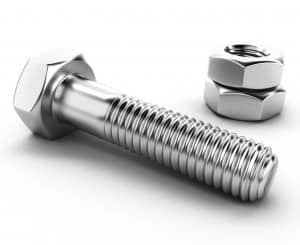
In any job requiring fasteners, it’s imperative to choose the right stainless steel hardware best suited for the projects, whether it’s for commercial, industrial, or domestic use. Fasteners are a necessary part in any job for they literally and figuratively, hold the world together. They are the hardware devices such as nuts and bolts and washers, nails and screws, which join or affix two or more objects, but can also be removed, replaced, or dismantled without damaging the joined objects.
When it comes to selecting the correct fastener material, builders, mechanics, and engineers must consider many factors. These include strength requirements, movement, stress, vibration, and ultimately, the environmental conditions the material will be subjected to. Simply choosing an inexpensive part or even the most expensive part will not matter unless you know what conditions the material will be used in. Atlantic Stainless would recommend using stainless steel fasteners as your hardware choice. The type and grade of stainless steel fasteners that you invest in will determine how durable and resistant they are to corrosion. Of the many factors to consider, then, prime among them would be what grade of stainless steel would be the right choice for the job.
As a point of fact, all metals, with the exception of platinum and gold, will corrode over time. How rapidly depends on the environment. Over the course of the last century, with the discovery and subsequent advancements made in the development of stainless steel, economical solutions have been found to fight the ever-present elements that cause corrosion. Stainless steel is a family of alloy steels containing a minimum of 10.5% chromium. The chromium, when in contact with oxygen, forms a natural barrier of chromium oxide called a “passive film”.
Stainless steel resists corrosion due to its ‘naturally’ occurring protective layer of chromium oxide. However, rust can occur only when oxygen reacts with the iron in the stainless steel. That can only happen when contaminants penetrate the protective layer and settle on stainless steel, and that depends on the grade, the surface finish, and environment. One trick to inhibit corrosion is electro-polishing, which can improve corrosion resistance by thickening the protective chromium oxide layer that forms on stainless steel.
As we’ve mentioned in these columns before, stainless steel comes in many different grades intended for many different applications. The most common grades used are 304 and 316, with the latter being more corrosion resistant than the former. If a fastener will be in a corrosive environment, say one that is damp, humid, or within a few miles or kilometers from the coast, using a 316 coating is highly preferable. Otherwise, the fastener will more than likely be prone to tea-staining, a corrosive process of uneven brown discoloration that affects the hardware.
The 316-grade stainless steel has high tensile strength along with its corrosion resistance that enables it to withstand harsh environments. Non-magnetic, it also must be hardened through cold working. As a hardware material, this grade of stainless steel is commonly used in the medical industry, forest and paper pulp industry, and in the production of dyes and chemicals.
The next grade of stainless steel for use in hardware materials is a 300 series grade known as 18-8, which refers to its chromium and nickel content percentages. An 18-8 grade fastener has 18% chromium and 8% nickel content and has better resistance to corrosion than most other stainless steel grades. It too is hardened through cold working and is nonmagnetic. It is ideal for applications in highly corrosive environments because of its superior corrosion resistance.
Stainless Steel Hardware Suppliers
As a general rule-of-thumb, always take the environment into consideration when deciding on your material needs. Whenever you’re seeking hardware and fasteners for a job, Atlantic Stainless recommends the material is stainless steel, and make sure that it’s graded 316 or 18-8.

